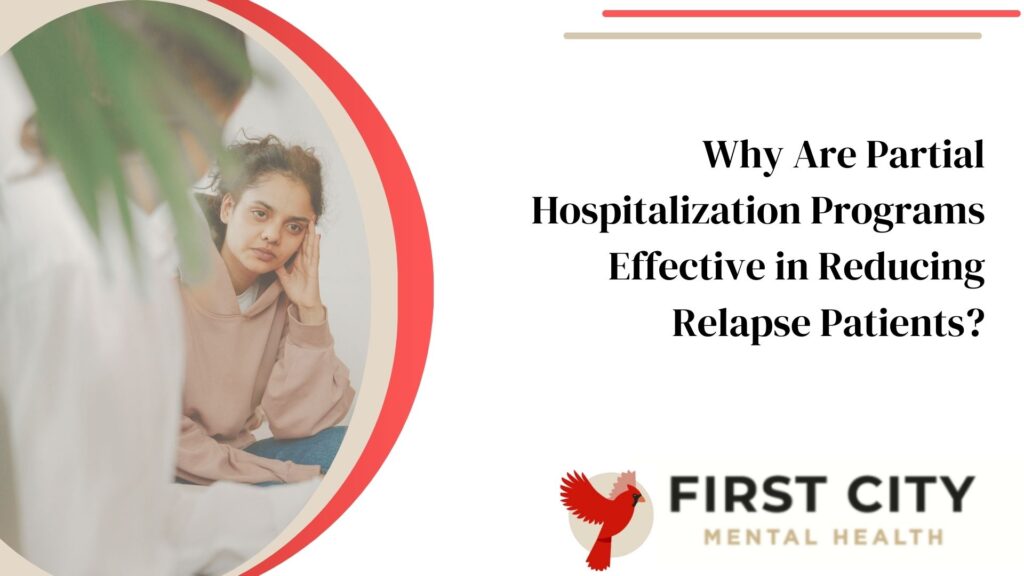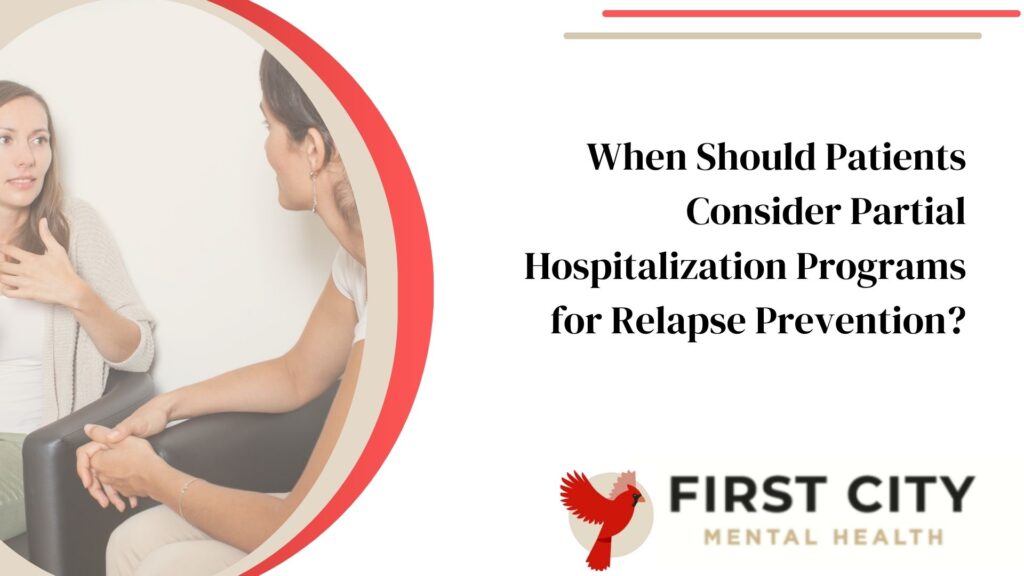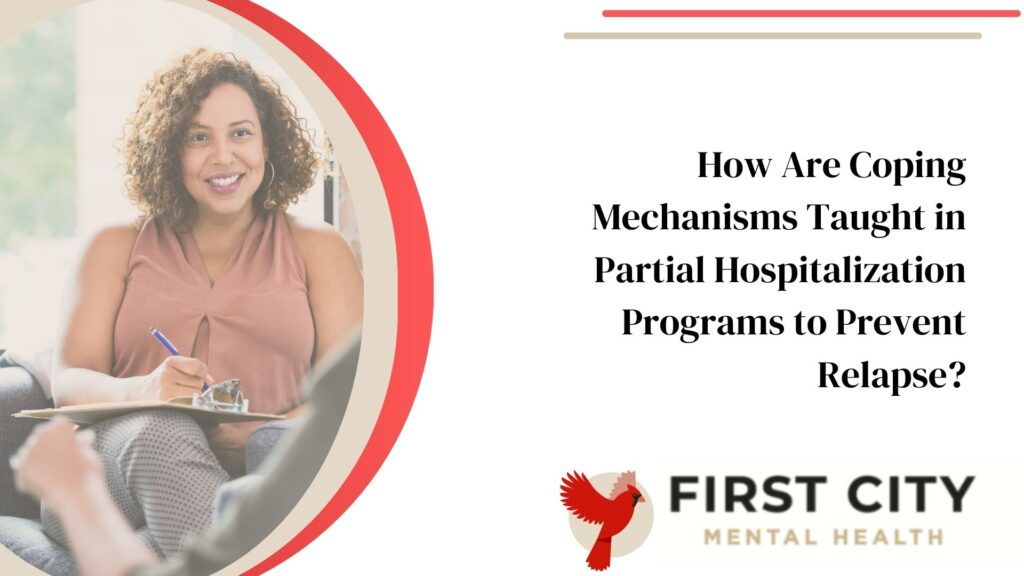
How to Choose the Right Partial Hospitalization Program in Kokomo?
January 27, 2025
Where to Look for Quality Partial Hospitalization Programs?
January 27, 2025Dealing with mental health concerns can be overwhelming, and preventing relapse is a significant challenge. For many, finding the right support to maintain stability is crucial.
Partial hospitalization program (PHP) provide an effective solution by offering intensive daily treatment while allowing patients to live at home. These programs include group therapy, individual therapy, and medication management designed to help stabilize mental health.
This article will explain how PHPs work in relapse prevention, who benefits most from them, and when they should be considered. Read on for practical insights into maintaining mental health stability through partial hospitalization programs.
Key Takeaways
- Intensive Day Treatment: Partial hospitalization programs (PHP) provide structured, intensive day treatment while allowing patients to live at home. This blend of treatment and independence helps patients apply learned skills in real-time.
- Comprehensive Therapies: PHPs use group therapy, individual therapy, and medication management. These therapies address personal issues, offer peer support, and ensure proper medication usage.
- Life Skills Training: Programs teach practical skills for daily living, such as time management and stress reduction techniques like mindfulness. These help patients gain confidence in managing their lives independently.
What Strategies Are Used in Partial Hospitalization Programs to Prevent Relapse?
Partial hospitalization Kokomo programs (PHPs) use many strategies to prevent relapse. These programs provide structured and intensive care.
- Group Therapy: Patients join group sessions to share their experiences and support each other. This builds a sense of community and reduces loneliness.
- Individual Therapy: One-on-one sessions with mental health professionals help patients address personal issues. Therapists use methods like dialectical behavioral therapy to teach coping skills.
- Medication Management: Doctors assess and adjust medications to stabilize mental health symptoms. Regular monitoring ensures proper treatment.
- Life Skills Reintegration: Programs teach practical skills such as time management, self-care, and financial planning. This helps patients return to daily life more confidently.
- Structured Environment: PHPs offer a controlled setting for recovery. Patients follow a set schedule, which includes therapy, meals, and breaks.
- Family Involvement: Families participate in therapy sessions to learn how to support their loved ones. Their involvement strengthens the patient’s support system at home.
- Education Programs: Sessions on stress management, nutrition, and exercise are provided. Educating patients promotes healthier living habits.
These strategies aim to create a supportive atmosphere for patients transitioning from residential treatment back into society.
Why Are Partial Hospitalization Programs Effective in Reducing Relapse Patients?

Mental Health Partial hospitalization program (PHP) help prevent relapse by providing intensive treatment without requiring patients to stay overnight. These programs offer various services, including group therapy, individual therapy, and medication management.
PHPs give patients the support they need while allowing them to live at home. This blend of structure and independence helps people immediately apply what they learn in their daily lives.
Patients benefit from regular check-ins with mental health professionals through these day programs. The close monitoring provides immediate adjustments to treatment plans if issues arise, which reduces the risk of relapse.
Patients also receive education on coping mechanisms during PHP sessions, which aid them in handling real-world challenges more effectively. The continuous support bolsters confidence, making it easier for individuals to maintain their progress once they are back in society full-time.
Who Benefits Most from the Relapse Prevention Techniques in Partial Hospitalization Programs?
People with severe mental health issues gain the most from these programs. Many have already completed a Residential Program and need ongoing support to reintegrate into society. These individuals require more care than outpatient services but do not need full-time inpatient treatment.
Adults who are overwhelmed by daily tasks also benefit greatly. The structured environment helps them manage their lives better. Therapeutic programming, including individual and group therapy sessions for 6-8 hours a day, provides much-needed stability.
Medication management and life skills reintegration teach them how to live independently again.
Partial hospitalization program mental health offers a lifeline for those needing intensive support without residential care.
When Should Patients Consider Partial Hospitalization Programs for Relapse Prevention?

Patients should consider Partial Hospitalization Program (PHP) for relapse prevention after completing a Residential Program. This step helps them transition back into society smoothly.
PHP aids individuals in returning to work or school and managing daily activities without being overwhelmed by mental illness.
Such programs in Indiana can assist adult patients in regaining stability while receiving intensive treatment. Joining a mental health partial hospitalization program offers an effective way to prevent setbacks and maintain progress toward wellness.
What Are the Key Components of Relapse Prevention Plans in Partial Hospitalization Programs?
Indiana partial hospitalization program offers structured support to prevent relapse. These programs include vital components to ensure patients stay on the path to recovery.
- Group Therapy Sessions allow people to share experiences and support each other, building community.
- Individual Therapy: One-on-one time with a therapist addresses personal issues. It helps tailor treatments to individual needs.
- Medication Management: Proper use of medication stabilizes mental health. Regular monitoring adjusts dosages as needed.
- Life Skills Training: Teaches how to handle daily tasks and responsibilities. Encourages independence and better coping mechanisms.
- Structured Daily Schedules: Provides routine and stability. Keeps patients engaged in productive activities.
- Family Involvement: This includes the family in therapy sessions and education. Strengthens support systems at home.
- Crisis Intervention: Ready response plans for emergencies to ensure safety and quick assistance if needed.
- Educational Workshops: Offers information on mental health topics. It helps patients understand their conditions better.
Each component focuses on helping individuals stabilize their mental health, regain independence, and build effective coping mechanisms for long-term success.
How Do Therapy Sessions in Partial Hospitalization Programs Aid in Relapse Prevention?
Therapy sessions in a partial hospitalization program PHP include individual and group therapy. These sessions help patients build strong habits for staying sober. They support mental health stability through medication management.
Sessions aim to stabilize mental health, which helps prevent relapse. Patients live in community or sober housing off-site during treatment, allowing them to practice daily tasks and reintegrate into society with support from their treatment team.
What Role Does Family Involvement Play in Relapse Prevention within Partial Hospitalization Programs?
Family involvement is crucial in relapse prevention within adult partial hospitalization program (PHP). Support from family members reinforces the skills and coping mechanisms learned in PHP.
This support system helps patients transition smoothly from PHP to independent living. Family members play a key role in identifying potential triggers, allowing for early intervention.
Educating families about mental health needs strengthens long-term relapse prevention.
In partial hospitalization programs, involving family aids successful reintegration into society. Families participate in aftercare planning, ensuring continued support post-PHP. Their involvement reduces stress and prevents relapse by providing emotional backing and understanding of treatment goals.
How Are Coping Mechanisms Taught in Partial Hospitalization Programs to Prevent Relapse?

Family support helps prevent relapse in the Partial Hospitalization Program in Indiana (PHP). Teaching coping skills is crucial to maintaining recovery.
Group Therapy
Patients share experiences in group sessions. These interactions help them learn from others and develop new coping strategies.
Individual Therapy
One-on-one sessions focus on personal struggles. Therapists teach specific techniques tailored to each patient’s needs.
Life Skills Reintegration
Programs include training for daily activities. Patients practice managing time, work tasks, and self-care routines.
Stress Management Techniques
PHPs teach methods like deep breathing and mindfulness. These skills reduce anxiety and improve emotional control.
Behavioral Activation
Activities that boost mood are part of the program. The patient is to engage in hobbies and exercise regularly.
Relapse Prevention Planning
Each patient gets a personalized plan. This includes identifying triggers and developing action steps to avoid them.
Role-Playing Scenarios
Practice scenarios help patients prepare for real-life challenges. These role-plays build confidence in using their new skills.
Education Sessions
Programs offer lessons about mental health conditions. Understanding these aspects helps patients stay vigilant about their recovery.
Peer Support Networks
Patients form connections with peers who provide encouragement and accountability.
Teaching these coping mechanisms ensures patients can manage daily stressors effectively after completing the program.
Conclusion
Partial hospitalization program use many tools to prevent relapse. Therapy sessions help people learn about their triggers. They also teach coping skills for real-life situations.
Patients get support from both staff and peers, boosting their confidence. Family involvement strengthens the support system at home. PHPs create a solid plan for each person’s needs, making recovery more effective and lasting.
F.A.Q.s
What is a partial hospitalization program (PHP)?
A partial hospitalization program (PHP) provides more intensive mental health treatment than regular outpatient care without requiring inpatient hospitalization.
How does a PHP help prevent relapse?
A PHP helps prevent relapse by offering structured daily treatment for a person’s daily functioning and providing support to manage mental health issues.
Who can benefit from an adult partial hospitalization program?
Adults needing more intensive treatment than typical outpatient services but not requiring full-time inpatient care benefit from an adult partial hospitalization program.
Are there specific requirements for joining a PHP in Indiana?
Yes, certain requirements, including referrals and insurance coverage checks, must be met for admission into a partial hospitalization program in Indiana.
What are the out-of-pocket costs for attending a PHP?
Out-of-pocket costs vary based on your insurance company, Medicare plans, and the specific treatment center’s fees.






